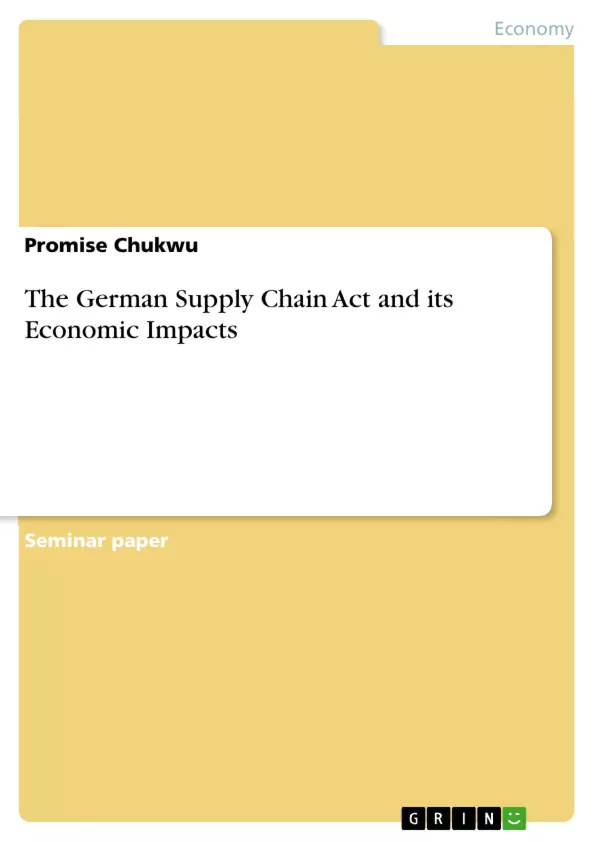The previous administration in Germany passed the German supply chain due diligence law known as "das Lieferkettengesetz‘" in June 2021. Now, what does this mean and what impact does it have on the supply chain processes of companies located in and outside Germany? The reason why the German parliament known as "Bundestag" passed this law will be addressed in full details.
Supply chain can be understood as a channel of distribution beginning with supplier of raw materials, components needed to assemble goods, this extends to the manufacturing processes, the distribution, and the retail and finally to the final consumer, with the primary goal of creating high level of competitive advantage. The popular definition of supply chain is that it is a set up approaches utilized to efficiently integrate suppliers, manufactures, warehouses and stores, to enhance the production and distribution of merchandise at the right quantities and the right location and right time. The purpose is to minimize costs and satisfy service-level requirements.
Inhaltsverzeichnis (Table of Contents)
- The Introduction
- Problem Definition
- Definition of Supply Chain management
- Definition of due diligence
- What does the Supply chain due diligence act exactly mean?
- Background
- Protection of human Rights objectives
- Creating accountability
- Examples of previous human right violation incidents
- Child Labor prevention
- Poor working conditions in Textile Industry
- Oil Spillage using Niger Delta Nigeria as an example
- Key Stakeholder Analysis
- The law enforcement and monitoring authorities
- Companies
- Worker in producing countries and civil organization
- Economic Impacts
- Impacts on Businesses
- Consumer
- German FDI and Import
Zielsetzung und Themenschwerpunkte (Objectives and Key Themes)
The primary goal of this paper is to explore the implications of the German Supply Chain Due Diligence Act ("Lieferkettengesetz") on companies operating within and outside Germany. It examines the law's rationale, its impact on supply chain processes, and its economic consequences for various stakeholders, including businesses, consumers, and German foreign direct investments.
- Human Rights Protection in Global Supply Chains
- Corporate Responsibility for Human Rights Violations
- Economic Impact of Due Diligence Legislation
- Stakeholder Analysis and Interdependence
- Legal Framework and Enforcement Mechanisms
Zusammenfassung der Kapitel (Chapter Summaries)
The introduction establishes the context for the study, outlining the problem of human rights violations in global supply chains and the rationale behind the German Supply Chain Due Diligence Act. It defines key terms like supply chain management and due diligence.
Chapter 2 delves into the background of the law, exploring the objectives of protecting human rights and creating accountability in supply chains. It provides a foundation for understanding the act's purpose and scope.
Chapter 3 offers concrete examples of human rights violations in global supply chains, including child labor, poor working conditions in the textile industry, and oil spills. These case studies illustrate the challenges associated with ensuring responsible sourcing and production practices.
Chapter 4 analyzes key stakeholders affected by the act, including law enforcement agencies, companies, workers in producing countries, and civil society organizations. It examines the roles and responsibilities of each group in implementing and monitoring the law.
Chapter 5 explores the economic impacts of the act on businesses, consumers, and German foreign direct investment. It investigates the potential costs and benefits of compliance and examines consumer behavior in relation to ethical sourcing practices.
Schlüsselwörter (Keywords)
The main keywords and focus topics include: Supply Chain Due Diligence Act, Lieferkettengesetz, Human Rights, Corporate Social Responsibility, Sustainable Supply Chains, Economic Impacts, Stakeholder Analysis, Globalization, Child Labor, Textile Industry, Oil Spills, German Foreign Direct Investment, Consumer Behavior, Ethical Sourcing, Legal Compliance.
Frequently Asked Questions
What is the German Supply Chain Due Diligence Act (Lieferkettengesetz)?
Passed in June 2021, it is a law requiring companies to ensure human rights and environmental standards are respected throughout their entire global supply chain.
Which companies are affected by this law?
The law primarily impacts large companies based in Germany, but also has significant ripple effects on their international suppliers and partners.
What are the main human rights objectives of the act?
The act aims to prevent child labor, forced labor, and poor working conditions, while also addressing environmental issues like oil spillage and pollution.
How does the act impact the textile industry?
Due to its history of poor working conditions, the textile industry is a key focus, requiring brands to take more accountability for the safety and rights of workers in producing countries.
What are the economic impacts on German Foreign Direct Investment (FDI)?
The paper investigates how stricter due diligence requirements might influence where German companies choose to invest and how they manage their import processes.
How is the law enforced and monitored?
The act establishes monitoring authorities that have the power to analyze corporate reports, conduct audits, and impose sanctions for non-compliance.
- Quote paper
- Promise Chukwu (Author), 2022, The German Supply Chain Act and its Economic Impacts, Munich, GRIN Verlag, https://www.grin.com/document/1196681



